PROMO!
First order? Get 10% OFF with this code: 1storder
Our Product Categories
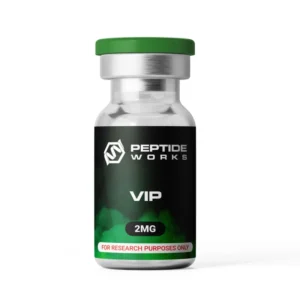
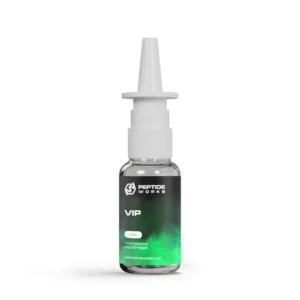
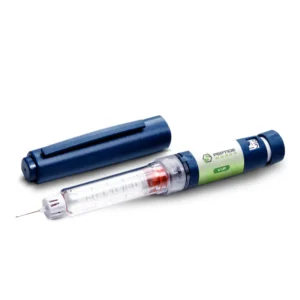
Vasoactive Intestinal Peptide (VIP) is a linear neuropeptide composed of 28 amino acids. It was first discovered in the intestinal tract but is now known to be widely distributed throughout the body, including the central and peripheral nervous systems. VIP belongs to the secretin/glucagon peptide family and functions as a neurotransmitter, neuromodulator, and hormone.
VIP is essential for controlling immunological response, inflammation, and neuroprotection. It has a major impact on vascular health due to its capacity to relax blood vessels. VIP exhibits significant therapeutic potential as a result of these varied functions. It is a promising area for future medical advancements as researchers investigate its use in treating autoimmune diseases, neurodegenerative conditions like Parkinson’s, and various cardiovascular health issues.
Peptide Sequence (IUPAC Condensed): H-His-Ser-Asp-Ala-Val-Phe-Thr-Asp-Asn-Tyr-Thr-Arg-Leu-Arg-Lys-Gln-Met-Ala-Val-Lys-Lys-Tyr-Leu-Asn-Ser-Ile-Leu-Asn-OH
Molecular Formula: C147H237N43O43S
Molecular Weight: 3326.8 g/mol
Synonyms: Vasoactive Intestinal Peptide
View the VIP Certificate Of Analysis (COA)

Research has shown that the Vasoactive Intestinal Peptide (VIP) functions by binding to its specific G-protein-coupled receptors, VPAC1 and VPAC2, on target cell surfaces. The adenylyl cyclase-cAMP signaling pathway is triggered by this interaction, raising intracellular cAMP levels.
This secondary messenger cascade mediates VIP’s diverse physiological effects. These effects include significant neuroprotection, vasodilation through smooth muscle relaxation, and strong anti-inflammatory responses by regulating cytokine production. Additionally, VIP controls gastrointestinal motility and secretion as well as immune cell activity.
VIP offers therapeutic opportunities for a number of conditions and plays a crucial role in preserving systemic homeostasis through these mechanisms.
Potent Anti-Inflammatory and Immunomodulatory Activity: Research suggests that Vasoactive Intestinal Peptide exhibits potent anti-inflammatory and immunomodulatory effects, making it a promising candidate for treating inflammatory and autoimmune diseases [1].
Studies show that VIP regulates innate immunity by inhibiting inflammatory cytokines and chemokines from macrophages, microglia, and dendritic cells, while reducing co-stimulatory molecule expression on antigen-presenting cells. In adaptive immunity, VIP shifts the Th1/Th2 balance by promoting anti-inflammatory Th2 responses and enhancing regulatory T cell (Treg) activity [2].
Studies in rheumatoid arthritis models demonstrate VIP’s ability to reduce systemic pathogenic antibodies and inflammation. Advances in VIP analogs and delivery methods highlight its potential for precision medicine in managing immune-related disorders [3].
Lung Protective Effects: VIP research demonstrates significant lung protective effects, including bronchodilation, surfactant support, and alveolar cell protection. VIP acts as a neuromodulator in the airway, relaxing smooth muscles and reducing inflammation, making it a potential treatment for asthma and COPD. Advances in VIP analogs, such as IK312532, and inhaler systems have improved its clinical viability [4].
In COVID-19 respiratory failure, the synthetic VIP Aviptadil showed promising results, doubling survival odds at 60 days and reducing cytokine release and respiratory distress. These findings highlight VIP’s potential in protecting lung function and treating severe pulmonary conditions with an acceptable safety profile [5].
Gastrointestinal Regulation: Research indicates that VIP Peptide plays a crucial role in gastrointestinal regulation and exhibits potent anti-colitic effects. Studies have shown that the peptide regulates gut motility, ion secretion, nutrient absorption, and immune responses, thereby contributing to overall gastrointestinal homeostasis.
In a TNBS-induced colitis model, VIP significantly reduced inflammation, weight loss, and intestinal damage by downregulating pro-inflammatory cytokines like TNF-α, IL-1, and IL-6, as well as Th1-driven autoimmune responses. It also decreased disease recurrence when administered after disease onset [6]. These findings highlight VIP’s potential as a therapeutic candidate for inflammatory bowel diseases like Crohn’s disease, offering both prophylactic and therapeutic benefits in managing gut inflammation [7].
Metabolic effects: Research shows that VIP has important effects on metabolism, especially in regulating glucose and cellular energy. Studies have shown that it helps stimulate insulin secretion in response to glucose through VPAC2 receptors and supports the growth of islet β-cells, making it a promising option for treating type 2 diabetes [8].
VIP also improves fatty acid uptake, lipid metabolism, and glucose use in cytotrophoblast cells, which benefits placental function and fetal development. While these findings suggest VIP could be useful for treating metabolic disorders and pregnancy-related complications, its short half-life limits its clinical use [9].
Cardiovascular Actions: Studies suggest that VIP plays a critical role in cardiovascular regulation, acting as a potent vasodilator that is 50–100 times stronger than acetylcholine. VIP enhances coronary blood flow, reduces vascular resistance, and improves cardiac contractility and heart rate. It also supports ventricular-vascular coupling by lowering arterial pressure [10].
During atrial fibrillation, elevated serum VIP levels correlate with low-voltage areas in the left atrium, suggesting its potential as a noninvasive biomarker for improved clinical management. These findings highlight VIP’s importance in maintaining cardiovascular function and its diagnostic potential [11].
Potential Tissue Protective and Anti-Cell Death Actions: Research on Vasoactive Intestinal Peptide has demonstrated its tissue-protective and anti-cell-death properties through its immunoregulatory and anti-inflammatory effects. Studies in rheumatoid arthritis models have shown that VIP reduces pathogenic antibody production and promotes regulatory T cell activity, mitigating tissue damage [3].
In lambs, VIP administration decreased pro-inflammatory cytokines and lipopolysaccharide (LPS) levels, reducing systemic inflammation. While VIP did not affect tight junction mRNA expression, its ability to lower inflammation highlights its potential in protecting tissues from damage in inflammatory conditions [12].
Buy VIP Peptide Nasal Spray from Peptide Works. The spray is available in 15ml and 30ml glass bottles, offering a simple, needle-free method of administration.
[1] E Gonzalez-Rey and M Delgado (2005) Role of vasoactive intestinal peptide in inflammation and autoimmunity – Current Opinion in Investigational Drugs, 2005 Nov, Volume 6 (Issue 11), Pages 1116-23.
[2] C Martínez, Y Juarranz, I Gutiérrez-Cañas, et al (2019) A Clinical Approach for the Use of VIP Axis in Inflammatory and Autoimmune Diseases – Int J Mol Sci, 2019 Dec 20, Volume 21 (Issue 1), Page 65.
[3] J Leceta, M I Garin, and C Conde (2021) Mechanism of Immunoregulatory Properties of Vasoactive Intestinal Peptide in the K/BxN Mice Model of Autoimmune Arthritis – Frontiers in Immunology, 2021 Jul 16, Volume 12, Page 701862.
[4] S Onoue, S Yamada, and T Yajima (2007) Bioactive analogues and drug delivery systems of vasoactive intestinal peptide (VIP) for the treatment of asthma/COPD – Peptides, Volume 28, Issue 9, September 2007, Pages 1640-1650.
[5] J Georges Youssef, P Lavin, D A Schoenfeld, et al (2022) The Use of IV Vasoactive Intestinal Peptide (Aviptadil) in Patients With Critical COVID-19 Respiratory Failure: Results of a 60-Day Randomized Controlled Trial -Critical Care Medicine, 2022 Nov 1, Volume 50 (Issue 11), Pages 1545-1554.
[6] C Abad, C Martinez, M G. Juarranz, et al (2003) Therapeutic effects of vasoactive intestinal peptide in the trinitrobenzene sulfonic acid mice model of Crohn’s disease – Gastroenterology, 2003 Apr, Volume 124 (Issue 4), Pages 961-71.
[7] M Iwasaki, Y Akiba, and J D Kaunitz (2019) Recent advances in vasoactive intestinal peptide physiology and pathophysiology: focus on the gastrointestinal system – F1000 Research, 2019 Sep 12, Volume 8:F1000 Faculty Rev-1629.
[8] X Hou, D Yang, G Yang, et al (2022) Therapeutic potential of vasoactive intestinal peptide and its receptor VPAC2 in type 2 diabetes – Frontiers in Endocrinology (Lausanne), 2022 Sep 20, Volume 13, Page 984198.
[9] F Merech, B Lara, D Rios, et al (2025) Vasoactive intestinal peptide induces metabolic rewiring of human-derived cytotrophoblast cells to promote cell migration – Biochimica et Biophysica Acta (BBA) – Molecular Cell Research, Volume 1872, Issue 2, February 2025, 119886.
[10] R J Henning and D R Sawmiller (2001) Vasoactive intestinal peptide: cardiovascular effects – Cardiovascular Research, Volume 49, Issue 1, January 2001, Pages 27–37.
[11] K Nishino, T Temma, H Natsui, et al (2025) Serum Vasoactive Intestinal Peptide as a Novel Biomarker for Low‐Voltage Areas in Patients With Atrial Fibrillation – Jounal of American Heart Association, 2025 Apr, Volume 14 (Issue 7), Page e039192.
[12] G K Mia, E Hawley, M Yusuf, et al (2024) The impact of exogenous vasoactive intestinal polypeptide on inflammatory responses and mRNA expression of tight junction genes in lambs fed a high-grain diet – Journal of Animal Science, 2024 Oct 13, Volume 102: skae309.
The answers to the most frequently asked questions about VIP.

VIP peptide may help ease brain fog by improving blood flow and calming inflammation in the brain. Early research shows VIP supports nerve health and helps balance immune activity, which can aid focus and mental clarity. Some clinical observations suggest potential cognitive benefits, but strong human studies are still needed to confirm these effects.
VIP peptide may help calm the immune system and lower inflammation linked to autoimmune diseases. Studies in animals show it can reduce harmful immune responses and support balance between protective and overactive cells. Early findings suggest potential benefits for controlling inflammation, and researchers continue to explore how VIP peptide might support immune health in different autoimmune conditions.
VIP peptide may cause effects like flushing, headache, dizziness, or changes in blood pressure during studies. It can also affect heart rate and digestion in some research models. These reactions happen because VIP widens blood vessels and influences smooth muscle activity. Scientists study these effects to understand better how VIP works in vascular, immune, and nervous system function.
The FDA does not approve VIP peptide for medical or therapeutic use. It is offered for laboratory research purposes only and is not for human or veterinary use. In the United States, it can be purchased legally for research under those conditions. Regulations may differ in other regions, so buyers should follow their local research and import laws.
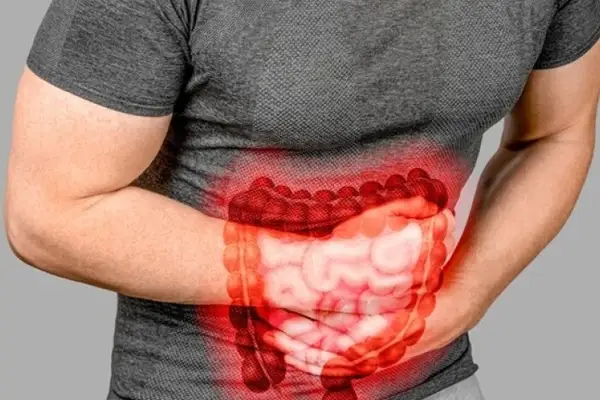
This blog looks at the role of peptides, especially VIP and BPC-157, in gut movement and digestive health. It explains how VIP helps control smooth muscle activity and gut signaling, while BPC-157 supports tissue repair and stability. Together, these peptides provide insight into maintaining a healthy digestive system and improving gut health research.
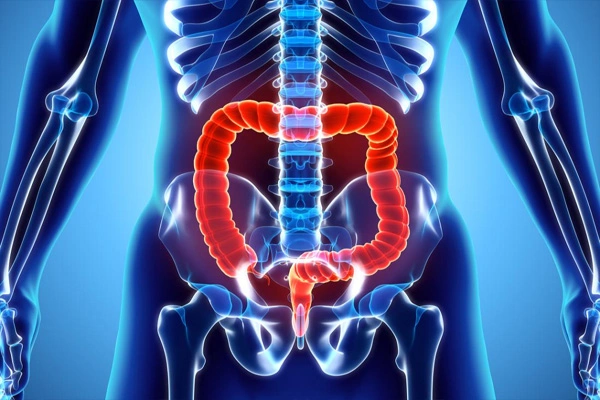
This article explores the roles of VIP Intestinal Peptide and BPC-157 in colitis research. It explains VIP’s role in regulating the immune system and BPC-157’s ability to help repair the gut barrier. By outlining their unique actions, the post shares insight into how these peptides may aid in inflammation control, support mucosal healing and advance colitis treatment studies.
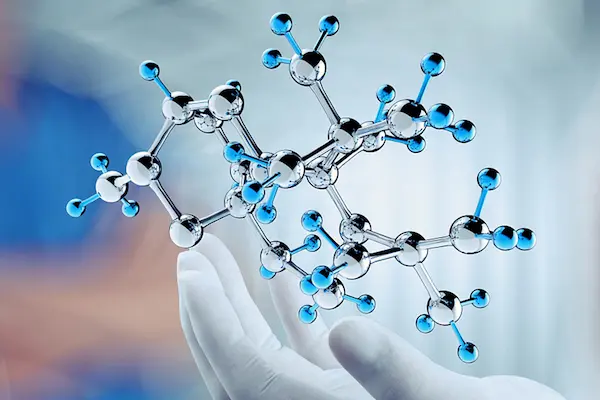
This blog explores the fascinating world of immunity peptides small chains of amino acids that play a vital role in immune system function. From Thymosin Alpha-1 to LL-37 and VIP, discover how these compounds enhance immune defenses, regulate inflammation and support balance. Peptide Works empowers researchers with high-quality peptides for groundbreaking discoveries.
ALL CONTENT AND PRODUCT INFORMATION AVAILABLE ON THIS WEBSITE IS FOR EDUCATIONAL PURPOSES ONLY.
DISCLAIMER: These products are intended solely as a research chemical only. This classification allows for their use only for research development and laboratory studies. The information available on our Peptide Works website: https://peptide-works.com/ is provided for educational purposes only. These products are not for human or animal use or consumption in any manner. Handling of these products should be limited to suitably qualified professionals. They are not to be classified as a drug, food, cosmetic, or medicinal product and must not be mislabelled or used as such.